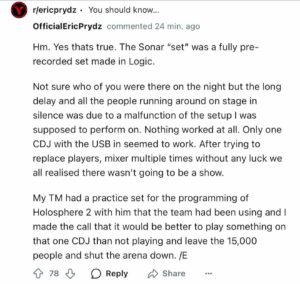The Web Summit, renowned for its convergence of technological innovation and industry leaders, recently encountered an unexpected twist when a supposed announcement by an Adidas executive and DJ Marshmello turned out to be a meticulously orchestrated hoax. What initially appeared to be a groundbreaking revelation of a “virtual oasis” called adiVerse quickly dissolved into a satirical performance orchestrated by a pair of activist provocateurs.
Aristide Feldholt, purportedly an “executive” of Adidas, alongside the iconic DJ Marshmello, graced Pavilion 3 of the Web Summit to unveil what was marketed as a visionary venture. However, the narrative swiftly unraveled, exposing the elaborate ruse engineered by the activist duo known as The Yes Men—disguised under the pseudonyms Andy Bichlbaum and Mike Bonanno—who assumed the roles of Feldholt and Marshmello, respectively.

Despite the striking physical disparities between Bichlbaum and the fictional Feldholt, the staged performance continued, with more than 24 hours passing before the true nature of the presentation came to light.
In a startling turn of events, The Yes Men revealed in a press release sent to journalists that the event organizers had fallen victim to their elaborate subterfuge, believing they had secured Adidas and DJ Marshmello as esteemed speakers. The activists clarified that their intent was not to perpetrate a hoax but to craft a pointed satire aimed at Adidas for their perceived inaction concerning labor issues within their operations.
Moreover, The Yes Men emphasized that the dancers from the Lisbon Breakers group, who performed a choreographed routine during the presentation, were inadvertently involved without realizing they were engaged by individuals posing as “imposters.”
The gravity of the situation escalated when the real DJ Marshmello confirmed the elaborate charade, underscoring the depth of the deception and the audacity with which the activist duo executed their plan.
This incident at the Web Summit serves as a reminder of the precarious nature of trust and verification in an age rife with sophisticated misinformation tactics. The ease with which the impersonators assumed false identities and leveraged the platform’s credibility to orchestrate a meticulously crafted satire raises questions about the checks and balances in high-profile events such as this.
While the actions of The Yes Men may be construed as a theatrical prank, the underlying motive underscores a broader discourse on accountability and corporate responsibility. The activists’ deliberate choice to utilize this platform to critique Adidas’s perceived shortcomings regarding labor practices serves as a stark reminder of the power of activism in the digital age.
As the dust settles on this controversy, it prompts introspection not only for event organizers but also for attendees and the media, urging a more critical assessment of information and speakers presented in such settings.
In the aftermath of this unexpected turn of events, it remains to be seen how the Web Summit and similar gatherings will fortify their screening processes to prevent future instances of deliberate misrepresentation.













